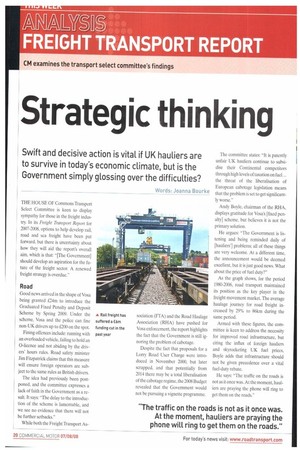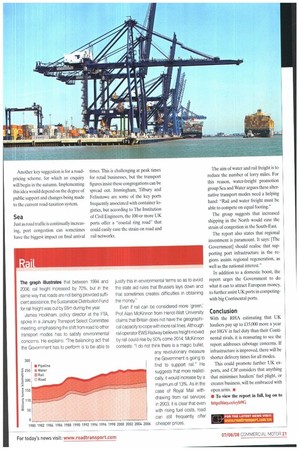Strategic thinking
Page 20

Page 21

If you've noticed an error in this article please click here to report it so we can fix it.
Swift and decisive action is vital if UK hauliers are to survive in today's economic climate, but is the Government simply glossing over the difficulties?
Words: Joanna Bourke THE HOUSE OF Commons Transport Select Committee is keen to display sympathy for those in the freight industry. in its Freight Transport Report for 2007-2008, options to help develop rail, road and sea freight have been put forward, but there is uncertainty about how they will aid the report's overall aim, which is that: "[The Government) should develop an aspiration for the future of the freight sector. A renewed freight strategy is overdue."
Road Good news arrived in the shape of Vosa being granted £24m to introduce the Graduated Fixed Penalty and Deposit Scheme by Spring 2009. Under the scheme. Vosa and the police can fine non-UK drivers up to £200 on the spot.
Fining offences include: running with an overloaded vehicle, failing to hold an 0-licence and not abiding by the drivers' hours rules. Road safety minister Jim Fitzpatrick claims that this measure will ensure foreign operators are subject to the same rules as British drivers.
The idea had previously been postponed, and the committee expresses a lack of faith in the Government as a result. It says: "The delay to the introduction of the scheme is lamentable, and we see no evidence that there will not be further setbacks."
While both the Freight Transport As sociation (ETA) and the Road Haulage Association (RHA) have pushed for Vosa enforcement, the report highlights the fact that the Government is still ignoring the problem of cabotage.
Despite the fact that proposals for a Lorry Road User Charge were introduced in November 2000, but later scrapped, and that potentially from 2014 there may be a total liberalisation of the cabotage regime, the 2008 Budget revealed that the Government would not be pursuing a vignette programme. The committee states: "It is patently unfair UK hauliers continue to subsidise their Continental competitors through high levels of taxation on fuel... the threat of the liberalisation of European cabotage legislation means that the problem is set to get significantly worse."
Andy Boyle, chairman of the RHA, displays gratitude for Vosa's [fixed penalty] scheme, but believes it is not the primary solution.
He argues: "The Government is listening and being reminded daily of [hauliers') problems; all of these things are very welcome. At a different time, the announcement would be deemed excellent, but it is just good news. What about the price of fuel duty?"
As the graph shows, for the period 1980-2006, road transport maintained its position as the key player in the freight movement market. The average haulage journey for road freight increased by 29% to 861an during the same period.
Armed with these figures, the committee is keen to address the necessity for improved road infrastructure, but citing the influx of foreign hauliers and skyrocketing UK fuel prices, Boyle adds that infrastructure should not be given precedence over a vital fuel-duty rebate.
He says: "The traffic on the roads is not as it once was. At the moment, hauliers are praying the phone will ring to get them on the roads." Another key suggestion is for a roadpricing scheme, for which an enquiry vvill begin in the autumn. Implementing this idea would depend on the degree of public support and changes being made to the current road-taxation system.
Sea
Just as road traffic is continually increasing, port congestion can sometimes have the biggest impact on final arrival times. This is challenging at peak times for retail businesses, but the transport figures insist these congregations can be spread out. Immingham, Tilbury and Felixstowe are some of the key ports frequently associated with container logistics, but according to The Institution of Civil Engineers, the 100 or more UK ports offer a "coastal ring road" that could easily ease the strain on road and rail networks. The aim of water and rail freight is to reduce the number of lorry miles. For this reason, water-freight promotion group Sea and Water argues these alternative transport modes need a helping hand: "Rail and water freight must be able to compete on equal footing."
The group suggests that increased shipping in the North would ease the strain of congestion in the South-East.
The report also states that regional investment is paramount. It says: [The Government] should realise that supporting port infrastructure in the regions assists regional regeneration, as well as the national interest."
In addition to a domestic boost, the report urges the Government to do what it can to attract European money, to further assist UK ports in competingwith big Continental ports.
Conclusion With the RI-IA estimating that UK hauliers pay up to £15,000 more a year per HGV in fuel duty than their Continental rivals, it is reassuring to see the report addresses cabotage concerns. If infrastructure is improved, there will be shorter delivery times for all modes.
This could promote further UK exports, and CM considers that anything that minimises hauliers' fuel plight, or creates business, will be embraced with open arms. • • To view the report in full, log on to http://tiny.ccieyb9G


























































































































































